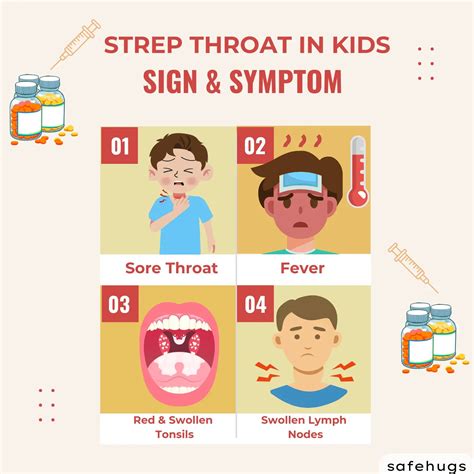Strep Throat Symptoms: Get Accurate Diagnosis

Strep throat, also known as streptococcal pharyngitis, is a highly contagious infection caused by the group A Streptococcus bacteria. It is a common illness that affects people of all ages, but it is most prevalent among children and adolescents. The symptoms of strep throat can vary from person to person, but they often include a severe sore throat, high fever, and swollen lymph nodes. In this article, we will delve into the symptoms of strep throat, discuss how to get an accurate diagnosis, and explore the available treatment options.
Understanding the Symptoms of Strep Throat
The symptoms of strep throat can be similar to those of a viral sore throat, making it challenging to diagnose without a proper medical examination. However, there are some distinct characteristics that can help distinguish strep throat from other types of sore throats. The most common symptoms of strep throat include:
- Severe Sore Throat: A sharp, stabbing pain in the throat that can make swallowing difficult and painful.
- High Fever: A fever that can range from 101°F to 104°F (38.3°C to 40°C), which can last for several days.
- Swollen Lymph Nodes: Enlarged lymph nodes in the neck, which can be tender to the touch.
- White Patches on the Tonsils: Small, white patches or streaks of pus on the tonsils, which can be a sign of infection.
- Swollen, Red Tonsils: Inflamed tonsils that can be bright red and swollen.
- Headache and Fatigue: A general feeling of being unwell, which can include a headache, fatigue, and a lack of energy.
- Nausea and Vomiting: Some people may experience nausea and vomiting, especially in severe cases.
Getting an Accurate Diagnosis
A proper diagnosis is essential to determine the cause of the sore throat and to rule out other conditions that may have similar symptoms. A healthcare professional will typically perform a physical examination and take a thorough medical history to diagnose strep throat. The diagnostic process may include:
- Rapid Strep Test: A quick test that can detect the presence of group A Streptococcus bacteria in the throat.
- Throat Culture: A test that involves taking a sample of throat secretions and culturing it in a laboratory to confirm the presence of the bacteria.
- Complete Blood Count (CBC): A blood test that can help rule out other conditions, such as a viral infection or mononucleosis.
Treatment Options for Strep Throat
If the diagnosis confirms strep throat, the healthcare professional will typically prescribe a course of antibiotics to treat the infection. The most common antibiotics used to treat strep throat include:
- Penicillin: A broad-spectrum antibiotic that is effective against a wide range of bacteria.
- Amoxicillin: A type of penicillin that is often used to treat strep throat in children and adults.
- Azithromycin: A macrolide antibiotic that is used to treat strep throat in people who are allergic to penicillin.
In addition to antibiotics, there are several home remedies that can help alleviate the symptoms of strep throat, such as:
- Staying Hydrated: Drinking plenty of fluids, such as water, tea, and soup, to help soothe the throat and keep the body hydrated.
- Resting the Voice: Avoiding talking or making excessive noise to help reduce strain on the throat.
- Using a Humidifier: Adding moisture to the air with a humidifier to help soothe the throat and relieve congestion.
- Gargling with Salt Water: Rinsing the throat with warm salt water several times a day to help reduce swelling and kill bacteria.
Complications of Untreated Strep Throat
If left untreated, strep throat can lead to several complications, including:
- Rheumatic Fever: A rare but serious condition that can occur when the bacteria that cause strep throat spread to other parts of the body.
- Kidney Infection: A bacterial infection that can spread to the kidneys and cause serious damage.
- Abscesses: Pus-filled pockets that can form in the throat and require drainage.
- Sinusitis: A bacterial infection that can spread to the sinuses and cause congestion, headaches, and facial pain.
Preventing the Spread of Strep Throat
Strep throat is highly contagious and can be spread through:
- Direct Contact: Touching or shaking hands with someone who has strep throat.
- Indirect Contact: Sharing food, drinks, or utensils with someone who has strep throat.
- Droplet Transmission: Inhaling droplets of saliva or mucus that contain the bacteria, which can be spread through coughing, sneezing, or talking.
To prevent the spread of strep throat, it is essential to:
- Practice Good Hygiene: Washing hands frequently with soap and water, especially after coming into contact with someone who has strep throat.
- Avoid Close Contact: Avoiding close contact with someone who has strep throat, such as sharing a room or kissing.
- Cover the Mouth and Nose: Covering the mouth and nose with a tissue or the elbow when coughing or sneezing to prevent the spread of droplets.
Frequently Asked Questions
What are the most common symptoms of strep throat?
+The most common symptoms of strep throat include a severe sore throat, high fever, swollen lymph nodes, white patches on the tonsils, and swollen, red tonsils.
How is strep throat diagnosed?
+Strep throat is diagnosed through a physical examination, medical history, and diagnostic tests such as a rapid strep test or throat culture.
What are the treatment options for strep throat?
+The treatment options for strep throat include antibiotics such as penicillin, amoxicillin, or azithromycin, as well as home remedies such as staying hydrated, resting the voice, using a humidifier, and gargling with salt water.
What are the complications of untreated strep throat?
+The complications of untreated strep throat include rheumatic fever, kidney infection, abscesses, and sinusitis.
How can I prevent the spread of strep throat?
+To prevent the spread of strep throat, it is essential to practice good hygiene, avoid close contact with someone who has strep throat, and cover the mouth and nose when coughing or sneezing.
Can strep throat be prevented with vaccination?
+There is no vaccine available to prevent strep throat. However, practicing good hygiene, avoiding close contact with someone who has strep throat, and covering the mouth and nose when coughing or sneezing can help reduce the risk of transmission.
By understanding the symptoms, diagnosis, treatment options, and prevention strategies for strep throat, individuals can take proactive steps to protect themselves and their loved ones from this highly contagious infection.


